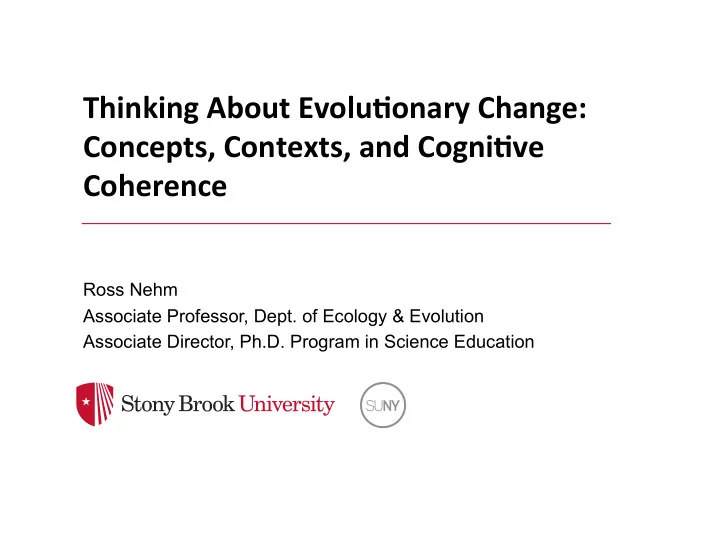

Thinking About Evolu0onary Change: Concepts, Contexts, and Cogni0ve Coherence Ross Nehm Associate Professor, Dept. of Ecology & Evolution Associate Director, Ph.D. Program in Science Education
Thinking about biology Foundations Disciplines Scale/units Diversity
Thinking about biology Foundations Heterogeneity of units Probabilis2c vs. determinis2c outcomes Many causes, weak effects (vs. few causes with strong effects) Historical con2ngency of systems
Thinking about biology Epistemology Disciplines Botany Zoology Evolu2on Ecology Gene2cs Causal principles
Thinking about biology Epistemology Disciplines Scale/units Ecosystems Clades Genes Receptors
Thinking about biology Epistemology Disciplines Scale/units Diversity Organisms, features
Unity & diversity of life • Unity—what is the same and why? • Diversity—what is different and why? Source: Wikipedia Dobzhansky
Unity & diversity of life • Unity—what is the same and why? • Diversity—what is different and why? • How do humans at different educational levels think about biological similarities and differences across scales and contexts? • What types of causal processes are Source: Wikipedia invoked to explain similarities and Dobzhansky differences across biological scales and contexts?
Diversity & unity across scales Different cell types same taxa Same cell type different taxa Differences between popula2ons of different taxa Between popula2ons of the same taxon Between individuals in a popula2on
Thinking about biology Diversity Spectacular phenotypic differences among lineages—and special similari2es. The phenomena experienced most directly during human ontogeny. Unity Causal similarity: gene2c, developmental, and evolu2onary processes occur across the tree of life. Unobservable processes least directly experienced during ontogeny.
Biology Educa2on Research • We have thousands of studies of student learning difficul2es in biology (e.g., see Duit bibliography). • What robust, generalizable claims can be made about student thinking about life? • An important goal of all disciples should be work towards causal principles that have broad explanatory power.
Thinking about life: diversity
Contexts and evolu2onary reasoning: experiments Coherence of ideas across lineages (as well as between popula2ons vs. species). Trait gain or loss
ACORNS instrument (Nehm et al. 2012) Experimental research design to try to establish generalizable findings about student reasoning.
Wri>en (or oral) explana0ons How would biologists explain how a species of cactus with spines evolved from a species of cactus without spines? � Concepts (composition) Model (how concepts are arranged or structured) 12,000 + wriZen explana2ons, 100+ interviews
Categorizing concepts students use to explain evolu2onary change
From concepts to models Nehm et al. (2012)
Comparing ACORNS item: cogni0ve coherence? coherence
Comparing ACORNS item: cogni0ve coherence?
Contexts and evolu2onary reasoning Reasoning bias Cita0on 1. Within-vs. between species (+ within) Nehm & Ha, 2011, JRST, Ha & Nehm 2014 2. Trait gain vs. trait loss (+gain) Nehm & Ha, 2011, JRST 3. Animal vs. plant (+animal) Opfer, Nehm, Ha, 2012, JRST 4. Familiar vs. unfamiliar (gender effects) Opfer, Nehm, Ha, 2012, JRST, etc.
Context : impact on concepts and models in novices Nehm & Ha (2011)
See also Nehm & Ridgway 2011
What about experts (evolutionary biologists?) Ph.D.
Contexts : novices and experts Expert reasoning Novice reasoning Item a: cheetah • Novices “frame” problems using concrete surface Explanatory features. model “A” • Experts solve Item b: bacteria problems using domain principles Explanatory Explanatory (e.g., natural model “N” model “B” selection). Item c: rose • Significantly greater coherence characterizes Explanatory experts; multiple model “C” explanatory models characterize novices. Nehm & Ridgway, 2011
Contextual stability (coherence) Co-existence, rearrangements of knowledge elements, as exper2se grows Expert-like (scien2fic) Mixed Novice-like (naïve) Nehm & Ha, 2011 Journal of Research in Science Teaching
Generalizability of model? • Studies of several thousand students in Germany, Indonesia, China, and Korea. • Several years of transla2on, back- transla2on, interviews, wriZen assessments. • Computer and human scoring (Ha, Nehm et al. 2013).
Contexts: Trait gain and loss in animals and plants Animal gain is easiest Similar reasoning across nations Plants hard: gain & loss
Context effects: naïve (intuitive) ideas Trait gain and loss in animals and plants > MIS loss all nations
Coherence? Reasoning models across 4 contexts 50% scientific models 25% mixed models 25% naïve models Explanatory tasks
Thinking about biology Student reasoning is strongly controlled by diversity Predictable reasoning difficulties
Contextual learning paZerns through 2me Norma2ve Mixed Naive None N = 856 students
Unity & diversity of life • How do humans at different educational levels think about biological similarities and differences across scales and contexts? • What types of causal processes are invoked to explain similarities and Source: Wikipedia differences across biological Dobzhansky scales and contexts?
Conclusions • Biological thinking appears to be conceptually constrained by the type of lineage that is evolving, along with biological scale, polarity, and familiarity; • Most learners across studies display mixtures of intui2ve and scien2fic resources, not just right or wrong models, and lack cogni2ve coherence. • Experts display coherent reasoning using norma2ve concepts—there is no “diversity effect.”
Why should we care about these findings? Researcher: in a general sense it is • important for biology educators to have robust models of how students reason about the diversity of life. Curriculum: case studies of par2cular taxa • and traits do not appear to promote coherence; unique models are built for each case. Pedagogy: certain contexts predictably elicit • naïve (or norma2ve) reasoning; knowing contexts can make teaching more efficient. Assessment: without tes2ng students across • contexts we can over- or underes2mate competency.
Thank you! Organizers for invita2on US Na2onal Science Founda2on REESE, CAREER, TUES, EAR programs for funding. Graduate students and postdocs (Minsu Ha, Meghan Federer, Chad Campbell, Liz Beggrow, Robyn Tornabene) and data collaborators Irvin Schonfeld, Ute Harms, Jorg Grosschedl and John Opfer.
Recommend
More recommend